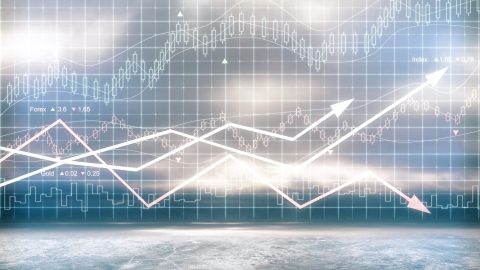Another year has passed, and it is time to look back. The year on the stock exchanges started out worse than in a long time. After only a few trading days, losses averaged 10%. The fear of economic turbulences originating in China dominated the markets. Meanwhile the currency of choice during a crisis, gold, was picking up speed, gaining 20% within a short period of time.
The equity markets hit their lows around mid-February. Global equities (as measured by the MSCI World index) had shed 17% by then. Surprisingly it was the central banks (above all Mario Draghi) that managed to calm the investors and herald a trend reversal on the equity markets. However, the change in sentiment did not mark a return to a normal state of affairs on the equity market: trends that had existed for years were broken, and the preference of investors turned significantly. At the beginning of the year, investors preferred companies with strong dividends; low interest rates and bond yields had driven conservative investors to the equity market. They preferred “boring” sectors such as utilities and telecoms, i.e. not sectors excelling in earnings growth, but in attractive dividends. Momentum and high growth failed to meet the initial euphoria.
Trend reversal in commodities as crucial factor for stock exchanges
The trend reversal of the oil price was a crucial factor for the stock exchanges. Commodities (sector: materials), which had been caught in a sustainable downward trend since mid-2014, finally bottomed out and embarked on an upward trend from mid-March onwards. As a result, two sectors, i.e. energy and materials, took centre stage and eventually left all other sectors far behind them in terms of 2016 performance. At +25.8% the energy sector closed the year in first place, followed by materials (+22.5%). Only the IT sector managed to somewhat keep up at +10.3%. Conservative sectors such as healthcare or consumer staples ended up far down the list.

Chart 1
Historical performance data are not indicative of the future performance. The chart is based on referential indices. Presentation before fees and taxes. Source: Bloomberg (31 December 2016)
Emerging markets stock exchanges benefit from the improvement on the commodity markets
The trend reversal on the commodity markets sparked the interest in selected emerging markets. Brazil – dominated by commodities – recorded an increase of 74% (in EUR) in 2016. Russia – the proverbial oil market – failed to match that performance at a still remarkable +50%. Overall the performance of certain emerging markets was enough to push the overall emerging markets performance ahead of the performance of the developed economies. This was unlike anything we had seen in the previous six years. The trend reversal on the commodity markets was followed suit by a general trend reversal in investor behaviour. Value shares, out of fashion for a long time, launched a remarkable comeback in 2016 at the expense of momentum and growth shares, which for a long time had been the investors’ first choice. Growth shares had outperformed value shares for the extraordinarily long period of ten years. This resulted in an according positioning of most of the investors, who were often having massive problems matching the market performance. This is not unusual at times when long-term trends are going through a reversal.

Chart 2, source: Thomson Financial Datastream
Historical performance data are not indicative of the future performance. The chart is based on referential indices.
Bank shares recorded a drastic increase
In summer 2016 the reflation trend continued, and bank shares embarked on a phase of strong outperformance. After all, a steeper yield curve benefits banks as well. This caused the outperformance of the value segment to speed up yet again, as chart 2 illustrates.
The surprising Brexit decision by the British citizens was causing short-lived jitters on the equity side. The British pound was more badly affected. But the weakness of the British pound supported the export-oriented UK companies, as a result of which the British market came in no. 1 among the developed European stock exchanges.
Trump’s election victory makes deflation fear fade into the background
The fear of deflation, which had extended into the beginning of 2016, is gradually waning. While Trump’s election victory in November did not set off this development, it did fuel it. As surprising as Trump’s victory may be, much of what he has announced or plans to do is inflationary. Apparently, this calms the majority of investors.
Many people expected greater frictions on the markets as a result of a positive Brexit vote and a victory by Donald Trump. In 2016 many investors had to learn again that political markets have short legs. – An old stock exchange rule that was confirmed yet again.
The deflation fear has been fading into the background among investors, and optimism is on the rise. A development few would have expected. However, that optimism has to be supported by action, which means that 2017 will definitely not be less any exciting than 2016.
Legal disclaimer
This document is an advertisement. Unless indicated otherwise, source: Erste Asset Management GmbH. The language of communication of the sales offices is German and the languages of communication of the Management Company also include English.
The prospectus for UCITS funds (including any amendments) is prepared and published in accordance with the provisions of the InvFG 2011 as amended. Information for Investors pursuant to § 21 AIFMG is prepared for the alternative investment funds (AIF) administered by Erste Asset Management GmbH pursuant to the provisions of the AIFMG in conjunction with the InvFG 2011.
The currently valid versions of the prospectus, the Information for Investors pursuant to § 21 AIFMG, and the key information document can be found on the website www.erste-am.com under “Mandatory publications” and can be obtained free of charge by interested investors at the offices of the Management Company and at the offices of the depositary bank. The exact date of the most recent publication of the prospectus, the languages in which the fund prospectus or the Information for Investors pursuant to Art 21 AIFMG and the key information document are available, and any other locations where the documents can be obtained are indicated on the website www.erste-am.com. A summary of the investor rights is available in German and English on the website www.erste-am.com/investor-rights and can also be obtained from the Management Company.
The Management Company can decide to suspend the provisions it has taken for the sale of unit certificates in other countries in accordance with the regulatory requirements.
Note: You are about to purchase a product that may be difficult to understand. We recommend that you read the indicated fund documents before making an investment decision. In addition to the locations listed above, you can obtain these documents free of charge at the offices of the referring Sparkassen bank and the offices of Erste Bank der oesterreichischen Sparkassen AG. You can also access these documents electronically at www.erste-am.com.
Our analyses and conclusions are general in nature and do not take into account the individual characteristics of our investors in terms of earnings, taxation, experience and knowledge, investment objective, financial position, capacity for loss, and risk tolerance. Past performance is not a reliable indicator of the future performance of a fund.
Please note: Investments in securities entail risks in addition to the opportunities presented here. The value of units and their earnings can rise and fall. Changes in exchange rates can also have a positive or negative effect on the value of an investment. For this reason, you may receive less than your originally invested amount when you redeem your units. Persons who are interested in purchasing units in investment funds are advised to read the current fund prospectus(es) and the Information for Investors pursuant to § 21 AIFMG, especially the risk notices they contain, before making an investment decision. If the fund currency is different than the investor’s home currency, changes in the relevant exchange rate can positively or negatively influence the value of the investment and the amount of the costs associated with the fund in the home currency.
We are not permitted to directly or indirectly offer, sell, transfer, or deliver this financial product to natural or legal persons whose place of residence or domicile is located in a country where this is legally prohibited. In this case, we may not provide any product information, either.
Please consult the corresponding information in the fund prospectus and the Information for Investors pursuant to § 21 AIFMG for restrictions on the sale of the fund to American or Russian citizens.
It is expressly noted that this communication does not provide any investment recommendations, but only expresses our current market assessment. Thus, this communication is not a substitute for investment advice.
This document does not represent a sales activity of the Management Company and therefore may not be construed as an offer for the purchase or sale of financial or investment instruments.
Erste Asset Management GmbH is affiliated with the Erste Bank and austrian Sparkassen banks.
Please also read the “Information about us and our securities services” published by your bank.

